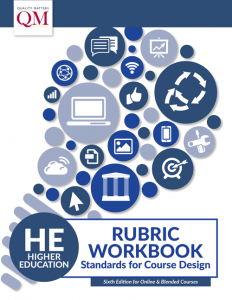“Grounded in research. Driven by best practices. A community that puts learners first.”
As I mentioned last week, I was recently at the annual Quality Matters Connect conference in St. Louis. Quality Matters is an inter-institutional peer review process dedicated to the continuous improvement of online and blended course design. This week TED Tips explores Quality Matters (QM). I serve as a Quality Matter Coordinator for the University of Wisconsin Whitewater. I am an official liaison between UWW and Quality Matters and am a go-to person for anything related to it. Please contact me if you have questions!

online course design is at the heart of quality matters
Quality Matters (QM) is a faculty-centered, peer review process designed to certify the quality of online courses and online components through a continuous improvement process. QM promotes and improves the quality of online education and student learning. It does so through the use of current, research-supported, and practice-based quality standards and appropriate evaluation tools and procedures. It supports professional development in the use of rubrics, tools and practices to improve the quality of online education. A QM-Certified Course is an online or blended course that has met QM Standards for a QM Rubric in an Official Course Review. Quality Matters is supported by the non-profit MarylandOnline. The QM Certification Mark is more than an achievement for online course design — it is evidence of an interconnected, continual process provisioned with tools, support and professional development that helps you develop and provide successful experiences to your learners.
Quality matters is best known for its review process for online or blended courses. Four underlying principles guide Quality Matters:
- Continuous: The Quality Matters process is iterative and committed to continuous quality improvement. Given review, revisions, and support, all reviewed courses will eventual meet expectations.
- Centered. Quality Matters is supported by national standards of best practice, research literature, and instructional design principles.
- Collegial. The process is faculty driven; peer reviews are diagnostic and collegial, not evaluative nor judgmental.
- Collaborative. Reviews are flexible and offer constructive feedback. They are not prescriptive.
The three main elements of Quality Matters are the QM Rubric, the peer review process, and professional development. It is important to emphasize that Quality Matters addresses only the course design of online classes. Quality Matters does not address the delivery (how instructors actually teach courses).
Quality Matters does not address other factors that may impact the quality of online courses such as faculty or learner readiness, and our digital learning environment. Many of these other factors are themes we explore each week in this TED Tips Blog. The Learning Technology Center offers additional faculty development opportunities to learn about Canvas or methods to improve your online and blended teaching effectiveness through programs like the upcoming Winterim Online / Blended Teaching Institute. Quality Matters addresses one aspect of online course quality – course design.
The most recent QM Higher Education Rubric, Sixth Edition, released July 2, 2018. The Quality Matters Rubric is designed to provide a rigorous set of Specific Review Standards that can be applied to online courses as part of a commitment to continuous quality improvement . While the emphasis is on online or blended courses, many of the design principles could also apply to traditional face-to-face courses.
These General Standards are:

Quality Matters Sixth Edition Rubric Workbook
- Course Overview and Introduction
- Learning Objectives (Competencies)
- Assessment and Measurement
- Instructional Materials
- Learning Activities and Learner Interaction
- Course Technology
- Learner Support
- Accessibility and Usability
QM courses use a faculty driven peer review process. There are several options for reviewing a course ranging from formal official course review following QM processes and protocols, an internal review, or more customized consultations. Internal reviews can guide and improve existing courses. Quality matters standards can be introduced to help scaffold the development of new online classes.
The review process is faculty driven and starts with a self-reported worksheet that lists basic information about the course that is useful to the review team, such as the delivery format, instructional materials, and supplemental materials that may require review. A formal peer review team is comprised of three faculty members includes a course representative. Each team includes a master reviewer that manages the process to ensure consistency and rigor; a Subject Matter Expert to advise the team about disciple-related materials and practices, and an External Reviewer outside our school to assist in providing helpful recommendations. The recommendations are constructive, specific, sensitive, and balanced to the course being reviewed. There is opportunity for revision to the course based on that feedback. Only official QM-Managed reviews can lead towards official QM Certification.
If you are interested in learning more about Quality Matters in Online Learning, exploring additional professional development opportunities, or would like to discuss other factors of the design and delivery of online courses please contact me at wittt@uww.edu.
– Ted Witt
Teaching, Learning, and Technology Consultant
RESOURCES:
https://www.qualitymatters.org/
https://www.qualitymatters.org/sites/default/files/PDFs/QM-Overview-Booklet-digital.pdf










